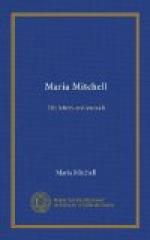“Aug. 29, 1875. Went to a Baptist church, and heard Rev. Mr. F. ’Christ the way, the only way.’ The sermon was wholly without logic, and yet he said, near its close, that those who had followed him must be convinced that this was true. He said a traveller whom he met on the cars admitted that we all desired heaven, but believed that there were as many ways to it as to Boston. Mr. F. said that God had prepared but one way, just as the government in those countries of the Old World whose cities were upon almost inaccessible pinnacles had prepared one way of approach. (It occurred to me that if those governments possessed godlike powers, they would have made a great many ways.)
“Mr. F. was very severe upon those who expect to be saved by their own deserts. He said, ‘You tender a farthing, when you owe a million.’ I could not see what they owed at all! At this point he might well have given some attention to ‘good works;’ and if he must mention ‘debt,’ he might well remind them that they sat in an unpaid-for church!
“It was plain that he relied upon his anecdotes for the hold upon his audience, and the anecdotes were attached to the main discourse by a very slender thread of connection. I felt really sad to know that not a listener would lead a better life for that sermon—no man or woman went out cheered, or comforted, or stimulated.
“On the whole, it is strange that people who go to church are no worse than they are!
“Sept. 26, 1880. A clergyman said, in his sermon, ’I do not say with the Frenchman, if there were no God it would be well to invent one, but I say, if there were no future state of rewards and punishments, it would be better to believe in one.’ Did he mean to say, ’Better to believe a lie’?
“March 27, 1881. Dr. Lyman Abbott preached. I was surprised to find how liberal Congregational preaching had become, for he said he hoped and expected to see women at the bar and in the pulpit, although he believed they would always be exceptional cases. He preached mainly on the motherhood of God, and his whole sermon was a tribute to womanhood.... I rejoice at the ideal womanhood of purity which he put before the girls. I wish some one would preach purity to young men.
“July 1, 1883. I went to hear Rev. Mr. —— at the Universalist church. He enumerated some of the dangers that threaten us: one was ’The doctrines of scientists,’ and he named Tyndale, Huxley, and Spencer. I was most surprised at his fear of these men. Can the study of truth do harm? Does not every true scientist seek only to know the truth? And in our deep ignorance of what is truth, shall we dread the search for it?
“I hold the simple student of nature in holy reverence; and while there live sensualists, despots, and men who are wholly self-seeking, I cannot bear to have these sincere workers held up in the least degree to reproach. And let us have truth, even if the truth be the awful denial of the good God. We must face the light and not bury our heads in the earth. I am hopeful that scientific investigation, pushed on and on, will reveal new ways in which God works, and bring to us deeper revelations of the wholly unknown.




